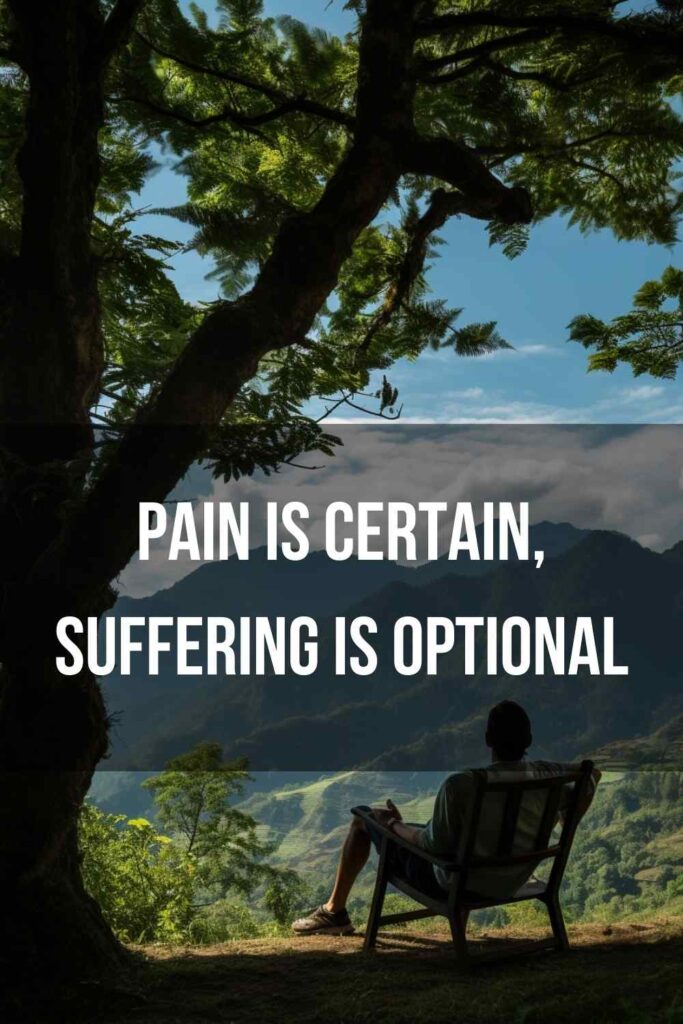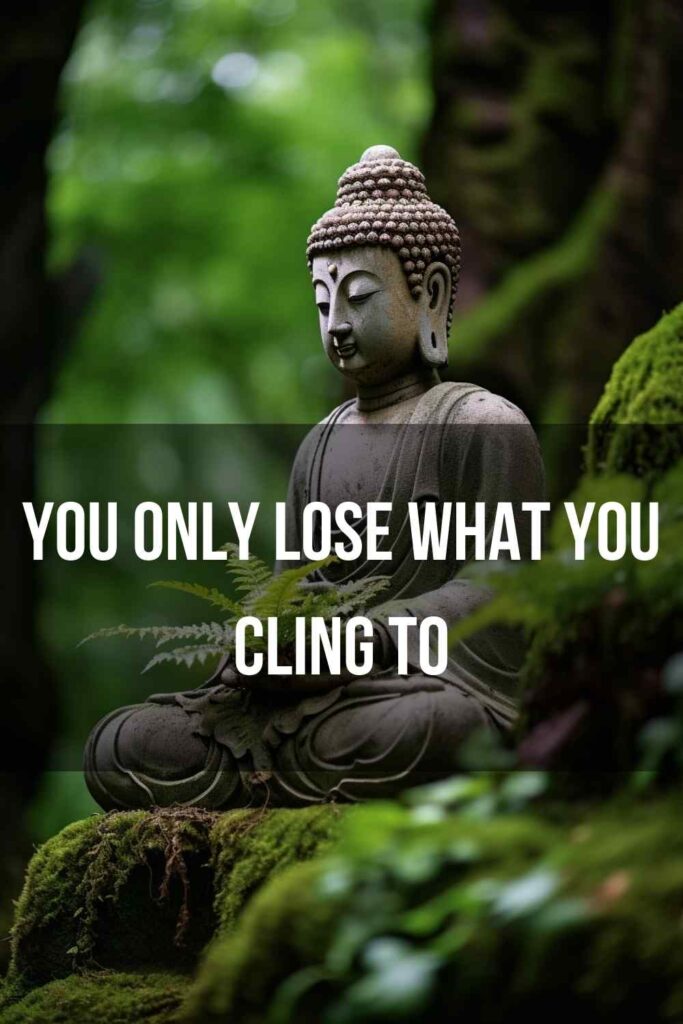One of the teachings of Buddhism states that the root of suffering is attachment. This idea is closely related to the law of detachment.
The Law of Detachment suggests that one way to achieve your goals is to stop being too attached to the exact outcome. It does not mean that you should give up on your goals, but that you should be more open to different ways to reach them.
The key is to let go of the need to control every little thing about your goal and be open to the endless possibilities that might come your way. Once you change direction this way, you will feel less stress and suffering.

In this article, we will explore
- the different foundations of the law of detachment
- how it can be applied to different aspects of your life
- the benefits, challenges, and practical tips for cultivating a creative mind and mindset of detachment.
Let’s start!
What is the Law of Detachment?
The principle of detachment is the right path that combines spirituality and clarity.
Imagine that you really want to achieve something, like getting your dream job or ace a test. Because of this, you try your hardest to avoid making even one wrong step toward your goals. It sounds pretty stressful, right?
The Law of Detachment tells you that while it is important to work hard and stay focused on your goals, you should also avoid being too fixated on the exact results that you want.
It is like planting a seed and taking care of it. At the same time, trust the natural flow of life and have faith that things will unfold in the best way possible.
This principle does not tell you to abandon your goals or wishes. It asks you to loosen up a bit on how exactly you want things to turn out.
Try to be open to the different ways to reach your goal. So, if something does not go according to plan, you can adapt and find new and unexpected solutions or directions.
Adapting and embracing this mindset gives you a sense of freedom to be surprised and enjoy your journey, rather than just reaching your goal.
Foundations of the Law of Detachment
The Law of Detachment is rooted in different spiritual traditions like Buddhism, Taoism, and Jainism. It tells us to keep our emotions separate from our goals and expected outcomes.
The psychological aspect of this principle encourages you to trust and let go of control.
Neuroscience points out that building new behaviors or starting a new relationship takes time. You need to avoid rushing the process or overthinking what will happen.
You need to trust and surrender yourself in the process. You need to develop patience and resilience, even though life feels uncertain.
Learn more about the laws of the universe with our post on Physical Laws of the Universe (12 Powerful Laws)

Practicing Law of Detachment in Your Life
You can practice the principle of detachment in different areas of your life. It’s all about balancing your effort and knowing when you need to take a step back and enjoy the ride.
Applying the Law of Detachment in Career, Relationship and Money
- Applying the Law of Detachment in Your Career
The principle of detachment can make a big difference in shaping your professional life.
It is about making a consistent effort to explore every opportunity that comes your way and getting to know the right people. Yet, you must also remember that you might not always get the job that you apply for, and that’s okay!
The key part is for you not to get discouraged. Sometimes, things do not work out the way you want them to, but that is a normal part of the journey.
Instead, learn from your experiences and keep doing your part. Keep building new connections so you can open up new doors and opportunities.
The principle of detachment teaches you to wait for the perfect opportunity because it will come when you are ready for it. Your career journey might take unexpected turns, but keep your professional goals in mind and stay focused on them.
Be proactive, work hard, and always stay positive. Trust that things will all fall into place when the time is right. This principle tells you to have faith in the unseen and always believe in yourself.
So, keep moving forward and do your part. The universe will take care of the rest.
- Applying the Detachment Law in Your Personal Relationships
Using the Law of Detachment in relationships can have a transformative effect.
It is about accepting people as they are and not trying to fit them into what you want. This means letting go of the idea that you need to control or change them.
This does not mean ignoring your feelings or not caring about your loved ones or life partner. It means giving them the freedom to be themselves.
Be open and understanding. Accepting your loved ones for who they are brings harmony and love into your life. It strengthens your neural pathways and your connection with them, more genuine, and filled with love.
When you practice detachment, appreciation and love will come from both sides without the burden of expectations to be something you are not.
Detached involvement in this case means you care for them, but you are not overly controlling or possessive. You don’t force solutions, you let them be free, and promote compassion in your relationships, making your bonds even stronger and more satisfying.
Relationships are important, so we have compiled some inspirational quotes for you: 50 Relationship Importance Quotes in Manifesting Good Relationships
- Applying the Law of Detachment in Managing Money
Applying detachment to managing your money can shift your mindset from one of scarcity to one of abundance.
It is all about having a peaceful mindset. Realize that constantly worrying about money can make it harder to attract financial abundance.
That doesn’t mean wasting money or ignoring your responsibilities—not at all! It’s about balancing working hard, making smart choices, and trusting that financial stability will follow.
When you practice detachment from your finances, you create space for your financial goals to happen. You feel more in control and free from fears and expectations.
Instead of waiting for a lucky break or for someone else to handle your expenses, you take charge.
This way, you are also building a healthier relationship with money. You will feel like more in control and less stressed about handling your financial situation.
So, don’t wait for luck or others to solve your money problems. Embrace the power of detachment and take charge of your money. You will find yourself in a world filled with amazing possibilities.

The Advantages of Practicing the Law of Detachment
There is more to gain from observing the principle of detachment than meets the eye. Keep in mind the following benefits that this principle can bring to your life:
1. Less Stress and Anxiety
One of the advantages of adopting detachment is that it reduces anxiety, negative emotions and stress.
When you learn when to let go of your obsession with specific results, you naturally stop worrying about the future.
This change in perspective provides you with a stronger sense of peace and assurance in your daily life.
2. More Flexibility and Adaptability
Detaching yourself from restrictive goals or plans has a great side effect: it improves flexibility and adaptability when dealing with difficulties in life.
Instead of following a certain path, you become more open to change and willing to appreciate unplanned twists and turns.
This improved adaptability enables you to better respond to unexpected situations and grab new opportunities as they come.
In other words, practicing detachment brings two benefits.
First, it gives you a sense of peace and freedom from worrying too much. At the same time, you learn to adapt and deal with the unpredictability of life with grace and confidence.
By practicing detachment, you are opening a world of infinite possibilities that will help you grow and feel like you’re much more fulfilled.
Practical Tips for Using the Power of the Law of Detachment
Here are two important tips to help you make the most of the principle of detachment:
1. Be in charge of what you can
When you start detaching, you focus on the things you can control.
Concentrate on actions that will move you closer to your goals instead of being excessively obsessed with specific results.
Doing this’ll clear your mind and allow room for better results to come to you naturally.
2. Embrace Uncertainty and the Unknown
Accepting uncertainty can at first appear a little frightening, but try to think of it as a playground with unlimited possibilities. It looks similar to an open space where freedom and creativity are welcome.
Take a risk and look at the unknown as a source of adventure and opportunity instead of letting fear of it hold you back. By letting go of your need for exactness, you make room for wonderful possibilities that you might not have been aware of.
Keep in mind that the Law of Detachment pushes you to let go of unnecessary concerns and inflexible standards so that you may develop a more laid-back and open-minded attitude in life.
You will find yourself going off on a road toward a more meaningful and enjoyable life by putting these two simple steps into action.
Share with us your thoughts in the comment section below!
Are you on a journey to self-improvement? Check out some of our posts related to being your best self:
- Mindset is Everything: The Key to a Happy Life
- Self-Love Journal, Love Should Start with You!
- The happy buddha: a path to a happy life
- A Simple 3-Step Process to Find Inner Peace in Conflict
- 369 Buddha Quotes about Life


